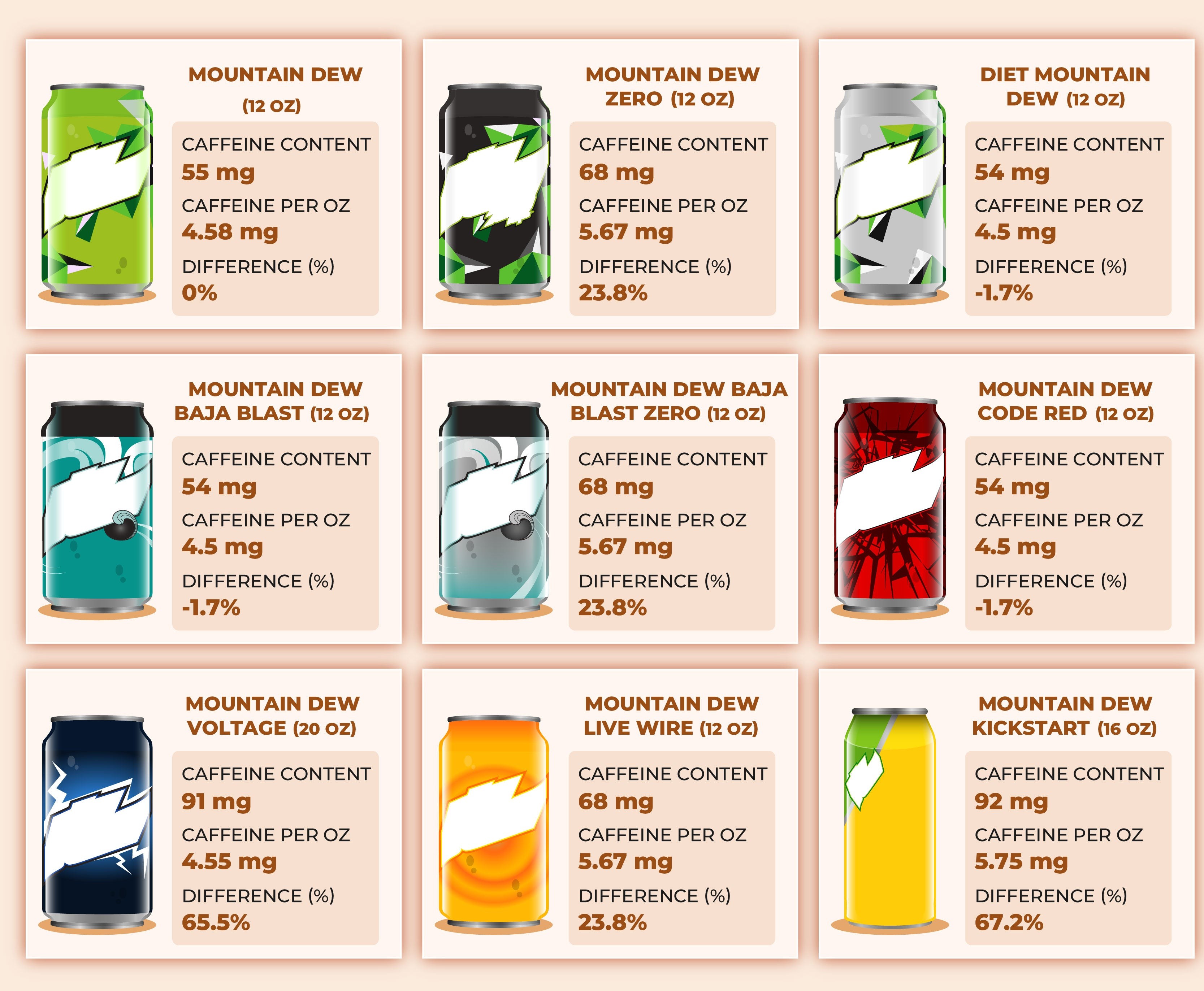Mountain Dew, with its electrifying citrus flavor, is a popular soda choice for those seeking a sweet and caffeinated kick. But just how much caffeine are you actually getting in a can of Mtn Dew? The answer varies depending on the specific product, but generally, the caffeine content in a can of Mountain Dew ranges from 55mg to 135mg. Let’s break down the details and compare it to other caffeinated beverages.
Unpacking the Caffeine Content in Mountain Dew
To understand the caffeine content of different Mountain Dew products, here’s a breakdown:
This information highlights that the caffeine amount can differ significantly between flavors and varieties.
Mountain Dew vs. Other Energy Drinks and Sodas
Mountain Dew is known for its caffeine content, but how does it stack up against other popular drinks?
This table provides a clear comparison, showing that while Mountain Dew has more caffeine than some sodas, it generally contains less than many popular energy drinks.
Mountain Dew Compared to Coffee: A Caffeine Showdown
Many people turn to coffee for a caffeine boost, so how does Mountain Dew compare? A 12-ounce can of Mountain Dew typically contains 55 mg of caffeine. In contrast, an average 8-ounce cup of coffee delivers between 80 and 100 mg of caffeine.
To further illustrate the caffeine differences, here’s a look at different coffee preparations:
As you can see, coffee generally packs a more significant caffeine punch than Mountain Dew.
Potential Risks and Side Effects of Caffeine
While caffeine can provide an energy boost, it’s important to be aware of the potential risks and side effects. Most healthy adults can safely consume up to 400 milligrams of caffeine per day. This is equivalent to about seven 12-ounce cans of regular Mountain Dew. However, individual tolerance can vary based on factors like age, gender, and underlying health conditions.
Excessive caffeine consumption can lead to:
- Insomnia
- Anxiety
- Increased heart rate
- Upset stomach
- Headaches
- Chest pain
- Heart palpitations
In rare cases, overconsumption can result in more serious medical issues, including confusion, hallucinations, difficulty breathing, and uncontrollable movements [1].
FAQs About Caffeine in Mountain Dew
Let’s address some frequently asked questions about the caffeine content in Mountain Dew:
1. Are there any caffeine-free Mountain Dew options?
Yes! Caffeine-Free Diet Mountain Dew exists. This version is ideal for those looking to avoid caffeine. However, it may not be available in all regions.
2. How much Mountain Dew is too much?
Aside from the caffeine, Mountain Dew is also high in sugar (around 46 grams per 12-ounce can). High sugar intake can contribute to health problems like diabetes, obesity, dental issues, heart disease, and fatty liver disease [2]. The American Heart Association recommends limiting added sugar intake to 25 grams per day for women and 36 grams per day for men. Therefore, moderation is key.
3. Is Mountain Dew safe for pregnant women?
Experts recommend that pregnant women limit their caffeine intake to less than 200 mg per day. Exceeding this limit can increase the risk of miscarriage, birth defects, premature labor, and reduced fertility [3]. Furthermore, the high sugar content and artificial additives in Mountain Dew pose additional concerns during pregnancy [4]. Occasional consumption may be acceptable, but it should not become a daily habit.
4. What happens when you mix Mountain Dew with alcohol?
Mountain Dew was originally intended as a mixer for moonshine. However, combining it with alcohol can be risky. The sugar and caffeine in Mountain Dew can mask the intoxicating effects of alcohol, leading to overconsumption and potential alcohol poisoning. It can also exacerbate dehydration and worsen hangovers.
5. Can Mountain Dew cause caffeine addiction?
Any beverage high in caffeine has the potential to lead to caffeine addiction [https://www.hopkinsmedicine.org/news/articles/2020/12/new-insight-into-caffeine-use-disorder]. Caffeine stimulates the brain’s reward centers, and regular consumption can result in physical dependence. Symptoms of caffeine addiction may include difficulty reducing caffeine intake, withdrawal symptoms (headaches, depression, anxiety), and strong cravings.
The Bottom Line
Mountain Dew contains a notable amount of caffeine, ranging from 55mg to 135mg depending on the specific product. While it provides a caffeine boost, it’s essential to be aware of the potential risks associated with excessive caffeine and sugar consumption. Enjoy Mountain Dew in moderation as part of a balanced lifestyle.
References
- Ágoston C, Bernáth L, Rogers PJ, Demetrovics Z. Stress, caffeine, and psychosis-like experiences-A double-blind, placebo-controlled experiment. Hum Psychopharmacol. 2022 May;37(3):e2828. doi: 10.1002/hup.2828. Epub 2021 Nov 18. PMID: 34792804.
- Lakin H, Sheehan P, Soti V. Maternal Caffeine Consumption and Its Impact on the Fetus: A Review. Cureus. 2023 Nov 4;15(11):e48266.
- Substances of Concern during Pregnancy. Accessed June 7, 2024.


